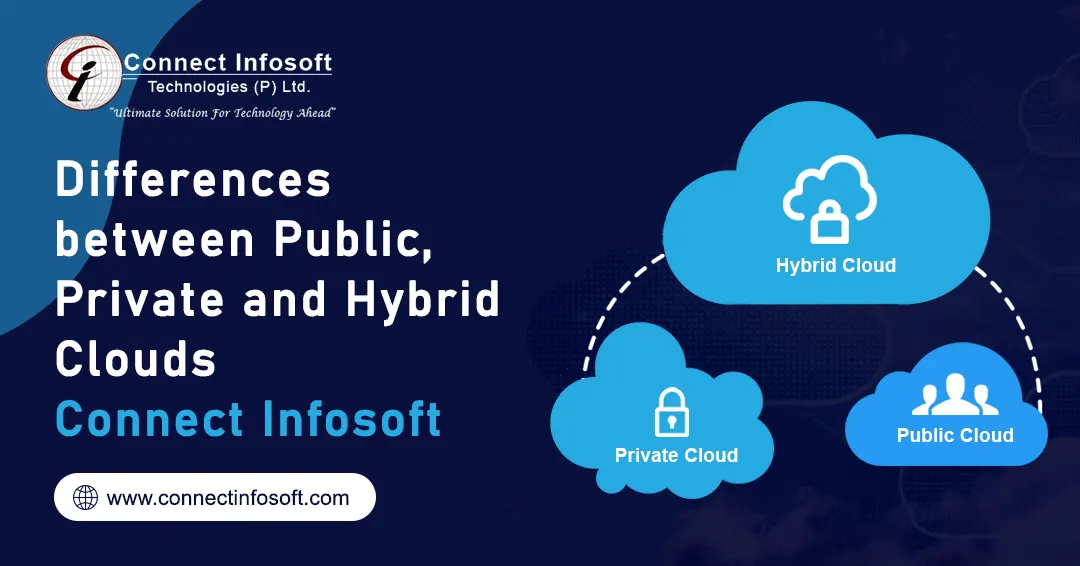| 
Cloud computing has transformed how businesses store, manage, and access their data and applications. As companies embrace the cloud, they often come across different deployment models: public, private, and hybrid clouds. Each cloud model offers distinct benefits and considerations, making it essential for businesses to understand their differences and choose the most suitable option for their specific needs. In this post, we will explore the characteristics, advantages, and challenges associated with public, private, and hybrid clouds.
Public Cloud:
The public cloud is a cloud computing model where services and infrastructure are provided by a third-party cloud service provider over the Internet. In this model, multiple organizations or users share the same pool of computing resources, including servers, storage, and networking infrastructure. Some popular public cloud providers include Amazon Web Services (AWS), Microsoft Azure, and Google Cloud Platform (GCP).
Advantages of Public Cloud:
1. Cost-Effective: Public clouds follow a pay-as-you-go pricing model, allowing businesses to scale their resources up or down as needed, resulting in cost savings.
2. Scalability: Public clouds offer virtually unlimited scalability, enabling businesses to quickly expand their resources based on demand.
3. Easy Setup and Maintenance: Public cloud providers handle infrastructure setup, management, and maintenance, freeing businesses from the burden of hardware and software updates.
4. Global Accessibility: Public clouds have a vast network of data centers worldwide, ensuring easy access to applications and data from anywhere with an internet connection.
Challenges of Public Cloud:
1. Security and Privacy: Since resources are shared among multiple users, there may be concerns about data security, privacy, and compliance, especially for businesses dealing with sensitive information.
2. Limited Control: Businesses have limited control over the underlying infrastructure and may face restrictions on customization and configuration options.
3. Reliance on Internet Connectivity: Public cloud services heavily depend on Internet connectivity, making downtime or connectivity issues potentially disruptive.
Private Cloud:
A private cloud is a cloud infrastructure that is completely dedicated to a single enterprise. It can be physically located on-premises within the organization's data center or hosted by a third-party service provider. Private clouds offer increased control, security, and customization options, making them a preferred choice for businesses with specific compliance requirements or sensitive data.
Advantages of Private Cloud:
1. Enhanced Security: Private clouds provide dedicated resources, enabling businesses to have greater control over security measures and data protection.
2. Customization and Control: Private clouds offer more customization options, allowing organizations to tailor the infrastructure and services to their specific needs.
3. Compliance and Regulatory Requirements: Private clouds are often suitable for industries with strict compliance and data sovereignty regulations, such as healthcare and finance.
4. Performance and Reliability: With dedicated resources, private clouds offer predictable performance and reliability, ensuring consistent availability of applications and data.
Challenges of Private Cloud:
1. Higher Costs: Private clouds require significant upfront investment and ongoing maintenance costs, including hardware, software, and skilled IT staff.
2. Limited Scalability: Private clouds have finite resources and may require additional investments to scale infrastructure to meet growing demands.
3. Complexity: Building and managing a private cloud infrastructure can be complex and requires specialized knowledge and expertise.
Hybrid Cloud:
A hybrid cloud is a combination of public and private clouds, allowing businesses to leverage the benefits of both models. It enables organizations to maintain sensitive data and critical applications in a secure private cloud while utilizing the scalability and cost-efficiency of public cloud resources for non-sensitive workloads.
Advantages of Hybrid Cloud:
1. Flexibility and Scalability: Hybrid clouds offer the flexibility to scale resources up or down by utilizing public cloud services during peak demand periods, ensuring optimal resource allocation.
2. Cost Optimization: Businesses can optimize costs by utilizing public cloud resources for non-sensitive workloads, reducing the need for additional private cloud infrastructure.
3. Data Control and Security: Sensitive data can be stored and processed in the private cloud, ensuring compliance and data protection while enjoying the benefits of public cloud services.
4. Disaster Recovery and Business Continuity: Hybrid clouds enable organizations to replicate and back up critical data and applications across public and private cloud environments, enhancing disaster recovery capabilities.
Challenges of Hybrid Cloud:
1. Integration Complexity: Integrating and managing resources across different cloud environments can be complex and requires careful planning and expertise.
2. Data and Application Compatibility: Ensuring seamless compatibility and data consistency between public and private cloud environments can be challenging.
3. Security and Compliance: Businesses must implement robust security measures and data governance policies to maintain data integrity and compliance across hybrid environments.
Conclusion:
Choosing the right cloud deployment model is crucial for businesses seeking to harness the benefits of cloud computing. Public, private, and hybrid clouds each have their strengths and considerations. Public clouds are cost-effective and scalable, whereas private clouds provide greater control and security. Hybrid clouds combine the best of both worlds, offering flexibility, cost optimization, and data control. By understanding the differences between these cloud models, businesses can make informed decisions and leverage the cloud to drive their digital transformation, enhance efficiency, and meet their specific business requirements. Consulting with a trusted cloud service provider like Connect Infosoft can further assist businesses in determining the optimal cloud strategy and implementing a seamless transition to the cloud, ensuring a successful and tailored cloud computing solution. |

